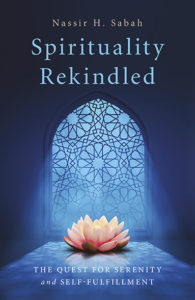(Original article: Mystic Living Today, June 2023)
Nassir H. Sabah
Humans have astonishing mental capacities that are stupendously beyond those of our closest biological kin, the chimpanzee, with whom we share about 95% of our DNA. These astonishing mental capacities must have been endowed by some power for a purpose.
This power can only be God Almighty, the creator of the universe and the guide and sustainer of everything in it. How do we know that God exists? The Quran provides unequivocal, science-based evidence that it cannot possibly be of human origin and must have been revealed by God, who therefore exists.
According to the Quran, God, in his infinite loving-mercy created humans for a purpose: to have eternal bliss in Heaven. This is the ultimate expression of God’s loving-mercy and is the greatest reward that one can hope for.
Had God wished, he could have made all humans angel-like and full of goodness, with no evil and suffering in this world. But life would then have no meaning. In his omniscience and wisdom, God created humans with a wondrous conscious self having the propensity for righteousness and wickedness and a free will to choose between the right path that leads to eternal bliss in Heaven and the wrong path that leads to suffering in Hell. This worldly life has therefore been made a trial for humans to earn eternal bliss in Heaven by following the right path, which is that of serving Him.
Like good servants, humans serve God by submitting to His will and seeking His loving-mercy by being merciful to others through virtuous conduct in this life, expressed in good deeds, kind words, and gracious behavior. This would be a reflection of God’s loving-mercy, the most consequential of God’s attributes.
Virtuous conduct is best fostered through a spirituality that is a quality of being predicated on a sense of close connection to God. The book, Spirituality Rekindled, presents a detailed roadmap for this spirituality, according to which virtuous conduct is the behavioral manifestation of successive building blocks of spirituality, namely, foundational beliefs, engendered feelings, occupying thoughts, and formative attitudes.
The advocated spirituality provides the solid foundation for continual, comprehensive, and ever-fulfilling self-development – spiritually, psychologically, morally, and intellectually. It is this self-development that gives meaning to life and makes us better human beings.
The advocated spirituality has immense psychological benefits in: (i) conquering negative feelings, such as envy and anger; (ii) alleviation of anxiety and stress, with their detrimental effects on health and well-being; (iii) fostering positive feelings and attitudes in promoting tolerance, understanding, and compassion towards all in contrast to ruthless competition, mindless materialism, and all forms of injustice, oppression, corruption, and exploitation; (iv) experiencing the joy of living without craving and greed, without excessive indulgence or anxiety about the ending of life’s pleasures, and with a liberating awareness of what is really important in life and what is vain, superfluous, and illusory, and (v) an elating spirituality that is reflected in an intense feeling of closeness and connectedness to God that engenders profound serenity and sense of self-fulfillment.
With reliance on God and deference to His will, one would fear nothing and no one; one would consider life as but a game, with its ups and downs, to be played as best as one can, without apprehension, and without losing sight of its ultimate purpose and meaning. One would tolerantly accept whatever comes, not regretting what was lost, nor overjoying at what was gained. Life’s challenges become steppingstones on the path of self-development, rather than stumbling blocks.
The advocated spirituality is beyond any religious affiliation. It can even be embraced by atheists once they get to believe in God.
For further information, visit https://nassirsabah.com
